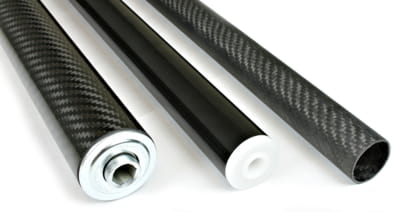What Are Carbon Fiber Idler Rollers?
 Conveyor systems have played a critical role in the evolution of industrial technology and material handling. The most famous use of conveyors was when Henry Ford created the model of modern assembly lines that revolutionized efficiency through the movement of materials and goods.
Conveyor systems have played a critical role in the evolution of industrial technology and material handling. The most famous use of conveyors was when Henry Ford created the model of modern assembly lines that revolutionized efficiency through the movement of materials and goods.
These systems are designed to move objects of different weights, shapes, sizes, and used in a variety of operating environments. One of the fundamental components of conveyor systems is idler rollers (also known as conveyor rollers) which are a series of free-flowing, cylindrical “wheels” in both gravity (unpowered) and powered conveyors, which use mechanical means to move products or materials along the system. As a key component, there are several considerations in the design of an idler roller to minimized downtime, operating costs, and performance in a conveyor system.
Carbon Fiber Material for Idler Rollers
Traditionally, idler rollers are constructed of metal (steel or aluminum) or plastic. Their design will depend on the application for determining both the size or diameter as well as the materials of construction. Carbon fiber is now an attractive option because of its inherent light weight and material strength. At 1/5th the weight of steel, half the weight of aluminum, and durability beyond plastic or rubberized rollers, their material properties provide clear advantages in performance and reliability
Carbon fiber idler rollers are constructed of low-weight, carbon fiber tubes and available in many diameters, strength characteristics, and options for inserts to provide customized functionality as a finished assembly. From a material standpoint, they are characterized by:
- High strength and stiffness to weight ratio
- Excellent resistance to fatigue
- Dimensional stability: Low CTE (Coefficient of Thermal Expansion)
- Resistance to chemical exposure and corrosion
These mechanical characteristics withstand the constant physical forces in conveyor systems operation. Carbon fiber rollers, because of their light weight, reduce friction on bearings while reducing the load on motors that result in less maintenance and power consumption.
Specific Application Advantages
Material Strength
The movement of heavy materials can cause metal rollers to warp, bend, and suffer from general wear over time due to their sheer weight. The impact force of loading materials such as heavy ore on mining conveyors or scrap metal onto sorting lines can also cause deformation of the rollers that result in decreased performance or even production stops for maintenance. Carbon fiber idler rollers minimize these effects because of their stiffness and resistance to fatigue when compared to aluminum or steel.
Chemical and Heat Resistance
Manufacturing environments often contain in-line “washing” stations on manufacturing and assembly lines to clean, pretreat, or rinse products traveling on conveyor lines through the process. These products will often be subjected to a variety of chemicals and operating temperatures. For example, in metal part production, corrosion inhibitors, cleaning agents, or surface treatments will be applied to the parts before final assembly or packaging. Metal part companies generally produce many types of metals with varying production methods. The chemicals used will have a range of pH levels (corrosivity) and applied at varying temperatures.
This will affect the materials of the construction of the conveyor system including the idler rollers. While steel alloys, aluminum, and plastics are commonly used and some resistance to chemical attacks and heat, they all may not be suited to the agents used in the process. The operating environments with fluctuations in temperatures also may cause failures due to warping.
The material properties of carbon fiber satisfy nearly all of the design considerations for idler rollers. Their high strength and stiffness for wear, impact, and temperature combined with chemical resistance should be considered in conveyor systems.
When designing advanced materials such as carbon fiber into a conveyor or automation project, engineers must determine which material properties are most important for specific applications. Turnkey solutions are also available to provide fully integrated assemblies as part of the custom carbon fiber fabrication and in-house design services.
Contact DragonPlate to find a creative solution to bridge the gap between cost and performance needs.